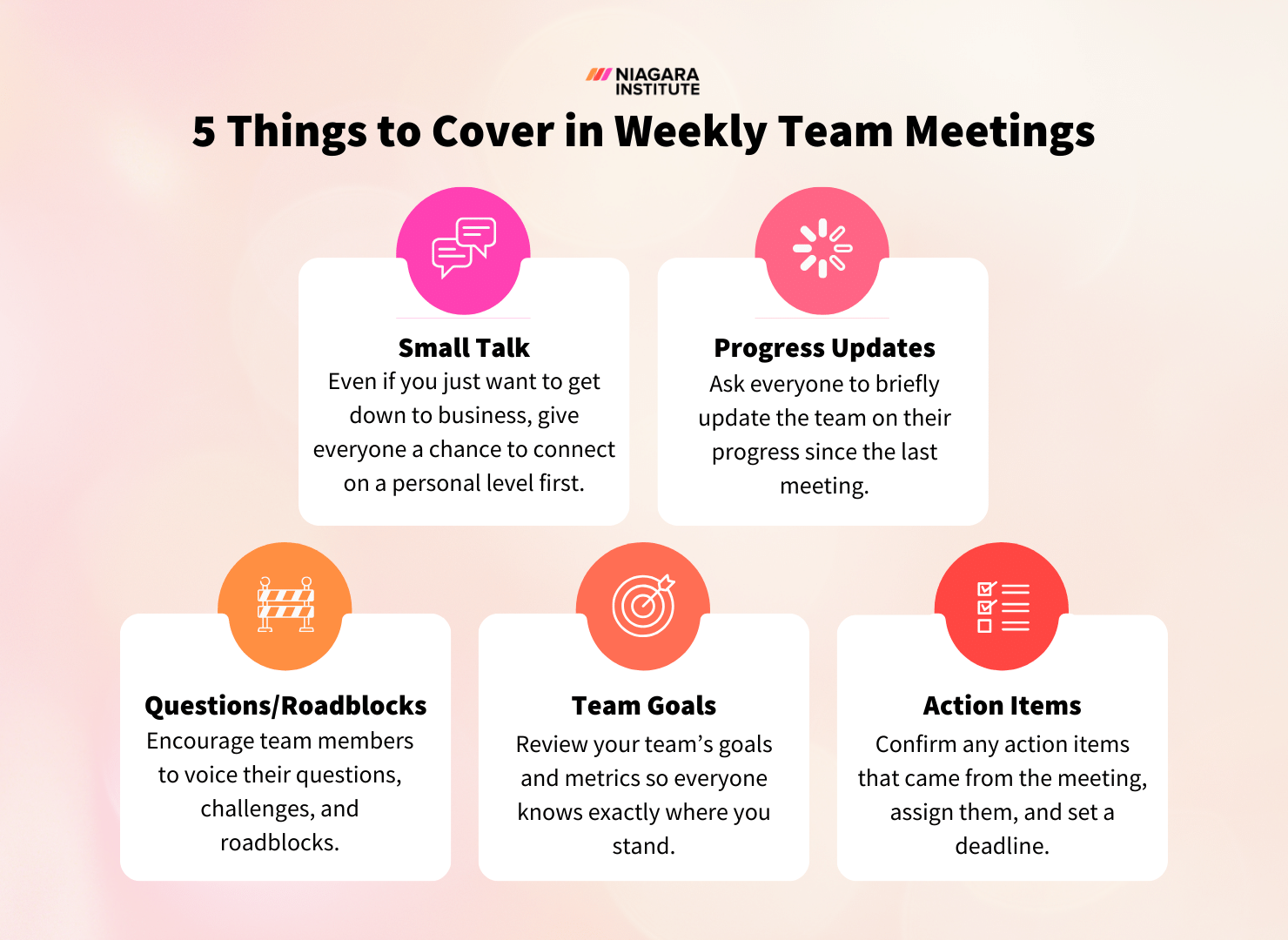9 min read
The Start-Stop-Continue Exercise: How To Conduct One (+Template)
In our search for improvement, we often find ourselves reflecting on what works, what does not, and what needs to change. This process of evaluation...
4 min read
 Michelle Bennett
:
Nov 9, 2023 5:00:00 AM
Michelle Bennett
:
Nov 9, 2023 5:00:00 AM
.png)
Weekly team meetings are a staple in the lives of many teams in the workplace. The purpose is to help ensure the team remains connected to each other, aligned with each other, and motivated as they work together towards a common goal. For some teams, weekly meetings may be one of the only chances they have all week to sit down and have a face-to-face conversation with their boss and teammates.
Despite their obvious importance, after a while, weekly team meetings can start to feel repetitive, stale, boring, or worse, like a waste of time.
Whether that’s where you fear you are now or if you’re simply trying to avoid getting to that point, this article is a must-read. We’re not only going to review what you need to cover in every weekly team meeting but also provide you with practical ideas and best practices that you can immediately apply to ensure effective meetings with your team. These strategies will help you take your meetings to the next level.
Before jumping into what you can add to your meetings, let’s review the five things you should cover in every weekly team meeting. If you’re missing or have been neglecting one or more of the areas, then that’s one of the first things you should work on. Now, here are the five things to cover in your weekly team meetings:

Once you’ve covered the basics, as outlined above, you may wish to periodically break things up by adding a simple team activity to your weekly team meeting agenda. Rather than a pointless or awkward icebreaker game, opt for an activity that has an obvious connection to the work the team does together. In fact, here are nine weekly team meeting ideas and activities that fit the bill.
Never underestimate the importance of documenting your team's purpose, goals, roles, responsibilities, and expectations in an easily accessible format. This is called a Team Charter, and it’s something you should create together as a team, possibly during one of your weekly team meetings! Not only does it make your team members feel like they’re a part of something and, therefore, feeds their sense of purpose, but it provides a level of clarity many people yearn for in the workplace.
When your team is faced with a problem, conflict, or decision, the Six Thinking Hats is a great activity to try during your weekly team meeting. Essentially, the idea is to metaphorically wear each of the six color-coded “hats,” which stand for a different perspective, and discuss the situation at hand from that perspective. It’s a challenging but rewarding exercise because it forces team members to look at the problem, conflict, or decision from a perspective they may not have otherwise considered.
Every team leader wants to see their team aligned because when they are difficult problems become easier, goals become more achievable, and collaboration comes more naturally. While actually making that a reality can be challenging, working through the Team Alignment Worksheet during one of your weekly team meetings can help you take a big step in the right direction.
One of the simplest weekly team meeting ideas to execute on this list is a Start-Stop-Continue. As the name suggests, it’s an activity in which your team discusses what you’re going to start doing, stop doing, and continue doing. It has countless use cases in the workplace, though some of the most common uses include when a team has made a mistake, set new goals, missed their targets, performed badly, or is beginning to implement a significant change initiative.
It’s a good idea for teams to occasionally assess their strengths and weaknesses in areas such as commitment, communication, clarity, accountability, psychological safety, culture, and achievements. Fortunately, this is another relatively straightforward weekly team meeting idea for you to facilitate, as it simply requires you to ask a series of questions and create a safe environment for team members to answer honestly and openly.
Given how busy many of us are at work, it can feel almost impossible to take time out of our days to reflect and learn from a situation. So, why not use some time in your weekly team meeting to do exactly that? When you do, use the Gibbs Reflective Cycle, as it can help your team analyze and understand their experiences, thoughts, and feelings on a level that leads to personal growth and better decision-making.
One idea for your weekly team meeting that you should conduct every so often is a SWOT analysis, which stands for Strengths, Weaknesses, Opportunities, and Threats. This exercise will enable your team to make decisions going forward that utilize the strengths of the team, minimize their weaknesses, capitalize on opportunities, and manage threats to their success.
When your team encounters problems, do you take the necessary time to understand what really happened? If not, the 5 Whys is an activity you can begin with your team that will help you identify the root cause of a problem so that you can work together to put an action plan in place.
Team culture is something that affects the productivity, morale, engagement, and satisfaction of each and every one of your team members. As such, it’s something that you should frequently talk about as a group. By giving your employees space to discuss what’s working and what’s not regarding their work environment, you’ll learn invaluable information that you can then turn around and use to make noticeable improvements.
.png)
9 min read
In our search for improvement, we often find ourselves reflecting on what works, what does not, and what needs to change. This process of evaluation...

8 min read
Leading a new project, forming a new team, or taking over an existing one can be exciting and daunting, and the kickoff meeting is the first...
.png)
7 min read
Do you want to be a great manager but it feels like you never have enough time and brain capacity to possibly meet everyone’s needs of you? If so,...